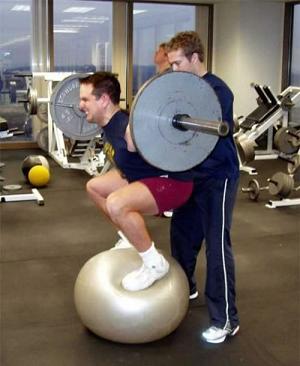Folks, today
is gonna be about boxing rather than lifting, but it’s really all the
same. The quote for the title of today’s
post comes by way of George Foreman, in a recent interview. For those of my readers who only known Mr.
Foreman as the guy who sells electric grills, George was a 2 time heavyweight
champion boxer, 2 time being significant in this instances as he experienced a
20 year gap between reigns as the champ.
This means that George got to fight in what many would argue to be the
greatest era of heavyweight boxing ever: The era of Muhammad Ali, wherein
George got to fight Ali, along with Joe Frazier (having beaten the latter
twice, both to win and retain the heavyweight title) but ALSO means that, during
his comeback era, he was around during the time of a prime Mike Tyson. Mike and George never fought, despite how
amazing of a match up it would have been.
George has been regarded by many to be one of, if not THE, hardest
punchers to exist in the sport of boxing, with devastating power in both hands
and a total willingness to stand and trade with any man, having weathered the
punishing shots from Joe Frazier. Tyson
is a man who needs no introduction, and his rise to the top of the sport was
like watching a sentient buzzsaw tear through unready heavyweight
fighters. How did this matchup never
occur? Because, as George said “I didn’t
want any part of Mike Tyson.”
Starts at 14m and 45 seconds
https://youtu.be/4-incOaF0dE?t=14m45s
Before I go
on, I am not going to hide, nor apologize for, my Mike Tyson fandom. If you grew up in the 80s and early 90s like
I did, you most likely feel the exact same way I do about Mike Tyson as a
fighter (reviews are, I’m sure, mixed of him as a person, but it’s not what
we’re here to discuss today). Mike Tyson
ruined pay-per-view parties, because his fights ended in 80 seconds. Fighters could not form strategies to fight
him based off fight tapes, because fights did not last long enough to figure
out how he fought. People always
wondered if he could go the distance because he NEVER had to. For the love of God, in the late 80s/early
90s, the most feared video bosses were Ganon, Dracula, and MIKE TYSON. We were effectively conditioned to be afraid
of this man, and in truth, before the UFC became REALLY big the whole world
pretty much agreed that the baddest man on the planet was always going to be
whoever held the heavyweight title in boxing, and Mike held ALL the titles. Mike Tyson could be on chemotherapy and men
my age would STILL be afraid to fight him TODAY.
HOWEVER,
Mike never tends to get ranked as the best of the best in boxing, and it’s due
to a fair critique: during his reign as champ, he didn’t fight anyone that was
particularly skilled. He tore through
all available opposition: it just so happened that the opposition that was
available wasn’t great. He beat an over
the hill Larry Holmes, but that was about it, and his loss in the Buster
Douglas fight proved that he COULD be stopped by someone that had a solid
gameplan against him. Foreman, with his
many decades of experience, to including against fighting some of the best to have
ever lived, means he very well could have put together a solid plan against
Mike. To the point that, when asked,
Foreman in the same interview is assured he would have won. He doesn’t waffle on it, he doesn’t go back
and forth, and doesn’t even say that on a good day Mike would have had him: he
is very confident that, if they had met up in Tyson’s prime, he would have
won. And yet, within the same interview,
he said he wanted nothing to do with Mike Tyson.
Why? “Because he is a monster. Mike is something you see in nightmares. And you just hope you wake up.” George went on the say “If he misses you with
the left, he hits with the right, and if he misses with the right…he bites
you!” And it fundamentally showed what
made Mike so much different than anyone else in his era, or really, anyone else
in his profession. Some boxers showed up
to box, and some showed up to win, and some even showed up to fight, but Mike,
quite frankly, showed up to hurt people.
He had “bad intentions”, to quote Jack Dempsey (who, in his fight with
Jess Willard, showcased such brutal domination that, quite frankly, in today’s
combat sporting era, he would have actually been charged with assault, battery
and attempt murder in the ring). And
even if you are the superior boxer, even if victory is assured, even if you’ve
fought “better” people: no one wanted to fight a man like Mike Tyson.
Because of
this, Mike so often won his fights before they even began. His opposition was so terrified of Mike that
they froze up, abandoned their gameplan, and went limp as soon as they were hit
to try to make the pain stop. Fighting
him became like riding a rodeo bull: dudes were just holding on for the
bragging rights of longest time. And now
we observe that he even had a shield to protect his legacy built in with this
mentality. There was George Foreman, on
his comeback, still a contender, eyeing up the heavyweight title, seeing Mike
Tyson there, KNOWING that he could win, and saying “…nah, I think I’ll wait
this one out.” As I wrote about before,
Mike became “more trouble than he was worth”, and in doing so, he crushed those
that were beneath his skills and even defeated those allegedly superior to him
through just sheer, unbridled nastiness.

Every Mike Tyson fight came with free facial reconstructive surgery

Every Mike Tyson fight came with free facial reconstructive surgery
I love this,
because it shows just how much one can be simply by changing how they THINK
about something. I’ll cop to Mike having
not been the best boxer ever. Hell, he
may not have even been the best boxer Cus D’Amato trained. Floyd Patterson was an intelligent and well
regarded student of Cus that obtained Olympic gold and was the youngest man to
hold the heavyweight title PRIOR to Mike, having made very effective use of the
exact same “peek-a-boo” style of boxing employed by Mike. However, Floyd never got to win the fights
before they started, and, in fact, endured such horrific mockery from Muhammad
Ali that some argue that it may have been responsible for the ending of his
boxing career as a whole. Put that same
skillset (or a lacking one perhaps) in Mike Tyson and pair it with Mike’s “bad
intentions” and suddenly things flip.
Suddenly the boxing “style” takes a back seat to the boxer himself, and
now it doesn’t matter if he’s a slugger or a boxer or a puncher or a counter
fighter: he’s got bad intentions, and he came here to hurt you.
You have the
same ability. You are born with your own
limitations. Your genetics, height,
structure, etc etc. There are some
things you do not have the power to change.
But you ALWAYS have the power to change how you think about things, and
how you approach them. And if you
approach them like a monster, like a nightmare, like a man with “bad
intentions”, like someone who came here to hurt people, you’re not just going
to beat those that are worse than you: you’re going to beat those that are
BETTER than you that don’t want any part of you. Some folks can make themselves bigger,
stronger, faster and better than you: make it so that no one can make
themselves nastier than you.







